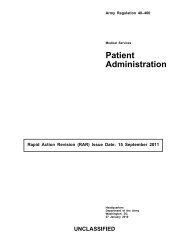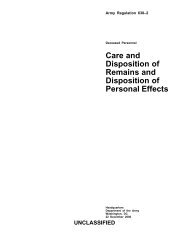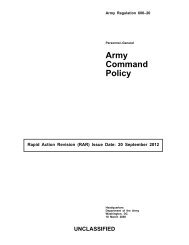Officer Transfers and Discharges - Army Publishing Directorate ...
Officer Transfers and Discharges - Army Publishing Directorate ...
Officer Transfers and Discharges - Army Publishing Directorate ...
You also want an ePaper? Increase the reach of your titles
YUMPU automatically turns print PDFs into web optimized ePapers that Google loves.
4–3. Medical condition<br />
a. An officer referred or recommended for elimination under this chapter who does not meet medical retention<br />
st<strong>and</strong>ards will be processed through both the provisions of this regulation <strong>and</strong> through the MEB/PEB process as<br />
described in paragraph 1–22.<br />
b. When it is determined the officer’s mental condition contributed to military inefficiency or unsuitability, the<br />
medical evaluation will include a psychiatric study of the officer. This study will indicate whether the officer was able<br />
to distinguish right from wrong <strong>and</strong> whether the officer currently has the mental capacity to underst<strong>and</strong> board <strong>and</strong><br />
judicial proceedings <strong>and</strong> participate in defense. When applicable, the report will also indicate whether the incapacitating<br />
mental illness could have been the cause of the conduct under investigation.<br />
c. At the time an officer is to appear before the Board of Inquiry, if he or she does not possess sufficient mental<br />
capacity to underst<strong>and</strong> the nature of the proceedings or does not behave or cooperate intelligently in defense, the<br />
proceedings will be delayed until the officer recovers, or the officer will be processed through medical channels,<br />
whichever applies.<br />
d. If a physical or mental condition develops after an officer has been recommended for involuntary separation or<br />
a f t e r t h e B o a r d o f I n q u i r y p r o c e e d i n g s a r e c o m p l e t e d , t h e o f f i c e r ’ s c o m m a n d e r w i l l i m m e d i a t e l y n o t i f y<br />
HRC–Alex<strong>and</strong>ria (AHRC–OPD–A).<br />
4–4. Limitations<br />
a. An officer will not be considered for involuntary separation because of conduct that has been the subject of<br />
judicial proceedings that resulted in an acquittal.<br />
b. Except as provided in d, below, no officer will be considered for elimination for reasons stated in paragraph 4–2<br />
because of conduct that has been the subject of administrative elimination proceedings that resulted in final determination<br />
that the officer should be retained in the Service. For purposes of this paragraph, an officer will be considered to<br />
have been the subject of elimination proceedings only if allegations against the officer were acted on by a Board of<br />
Inquiry convened under this chapter.<br />
c. The limitations set forth in b above are not applicable when—<br />
(1) Substantial new evidence is discovered that was not known at the time of the original proceedings despite the<br />
exercise of due diligence <strong>and</strong> that would probably produce a result significantly less favorable for the officer at a new<br />
hearing.<br />
(2) Subsequent conduct by the officer warrants considering him or her for discharge. Such conduct need not<br />
independently justify the member’s elimination but must be sufficiently serious to raise a substantial question as to the<br />
officer’s potential for further useful military service. However, this exception does not permit further consideration of<br />
conduct of which the officer has been absolved in a prior final factual determination based on the merits by a judicial<br />
body.<br />
(3) An express exemption has been granted by HRC, in writing, upon a determination that administrative separation<br />
should be effected because of the unusual circumstances of the case.<br />
d. Under the circumstances in (1) through (4) below, an officer who has been considered for elimination <strong>and</strong><br />
retained on AD may again be required to show cause for retention:<br />
(1) An officer may be again considered for elimination because of lack of proficiency or recurrent misconduct<br />
subsequent to the earlier consideration.<br />
(2) An officer may be again considered for elimination because of misconduct that occurred prior to that alleged in<br />
the earlier proceedings but that was not sooner discovered despite the exercise of due diligence.<br />
(3) An officer who has been considered for elimination for subst<strong>and</strong>ard performance of duty <strong>and</strong> retained may again<br />
be considered for elimination for subst<strong>and</strong>ard performance of duty at any time 1 year after the prior case has been<br />
closed.<br />
(4) An officer may be considered for elimination for misconduct, moral or professional dereliction, or in the interest<br />
of national security at any time subsequent to the closing of the prior case that resulted in the officer’s retention on<br />
AD. However, an officer may not again be required to show cause for retention on AD solely because of conduct that<br />
was the subject of the previous proceedings, unless the findings <strong>and</strong> recommendations of the Board of Inquiry or the<br />
Board of Review that considered the case are determined to have been obtained by fraud or collusion. The grounds for<br />
elimination in the earlier case may be joined with new grounds in the later case, provided the earlier elimination<br />
proceedings does not include a factual determination specifically absolving the member of the allegations then under<br />
consideration. If the grounds for elimination in the earlier proceedings are joined, the additional grounds considered in<br />
the subsequent proceedings need not independently justify the member’s discharge but must be sufficiently serious to<br />
raise a substantial question as to the member’s potential for further useful military service.<br />
e. Punishment resulting from trial by court-martial or under the provisions of UCMJ, article 15, for misconduct <strong>and</strong><br />
subsequent use of this fact in support of elimination under this regulation do not constitute double jeopardy.<br />
AR 600–8–24 12 April 2006<br />
59
















